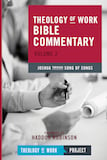God Calls People to Provide Opportunities for the Poor to Work Productively (Ruth 2:17-23)
Bible Commentary / Produced by TOW Project
The most important way God overcomes the barriers to our fruitfulness is through the actions of other people. In the Book of Ruth, we see this both in God’s law in society and in his guidance of individuals.
God’s Law Calls People of Means to Provide Economic Opportunities for the Poor (Ruth 2:17-23)
Back to Table of Contents Back to Table of ContentsThe action of the Book of Ruth centers around gleaning, which was one of the most important elements of the Law for the protection of poor and vulnerable people. The requirements are laid out in Leviticus, Deuteronomy, and Exodus (click on the links below to see more on each of the relevant passages.)
When you reap the harvest of your land, you shall not reap to the very edges of your field, or gather the gleanings of your harvest. You shall not strip your vineyard bare, or gather the fallen grapes of your vineyard; you shall leave them for the poor and the alien: I am the Lord your God. (Leviticus 19:9–10, repeated in part in Leviticus 23:22) See "Leviticus 19:9-10" in Leviticus and Work at www.theologyofwork.org.
When you reap your harvest in your field and forget a sheaf in the field, you shall not go back to get it; it shall be left for the alien, the orphan, and the widow, so that the Lord your God may bless you in all your undertakings. When you beat your olive trees, do not strip what is left; it shall be for the alien, the orphan, and the widow. When you gather the grapes of your vineyard, do not glean what is left; it shall be for the alien, the orphan, and the widow. Remember that you were a slave in the land of Egypt; therefore I am commanding you to do this. (Deuteronomy 24:19–22)
For six years you shall sow your land and gather in its yield; but the seventh year you shall let it rest and lie fallow, so that the poor of your people may eat; and what they leave the wild animals may eat. You shall do the same with your vineyard, and with your olive orchard. (Exodus 23:10–11) See "Exodus 22:21-27 & 23:10-11" in Exodus and Work at www.theologyofwork.org.
The basis of the law is the intention that all people are to have access to the means of production necessary to support themselves and their families. In general, every family (except among the priestly tribe of Levites, who were supported by tithes and offerings) was to have a perpetual allotment of land that could never be alienated (Numbers 27:5-11, 36:5-12; Deuteronomy 19:14, 27:17; Leviticus 25). Thus everyone in Israel would have the means to grow food. But foreigners, widows, and orphans typically would not receive an inheritance of land, so they were vulnerable to poverty and abuse. The gleaning law gave them the opportunity to provide for themselves by harvesting the edges of the field, the grain and produce that were unripe or missed during the initial harvest, and whatever sprang up in the fields that lay fallow any given year. Access to gleaning was to be provided free of charge by every landowner.
These passages suggest three grounds for the gleaning laws. Generosity toward the poor (1) was a prerequisite to God blessing the work of peoples’ hands (Deuteronomy 24:19); (2) was to be driven by the memory of Israel’s experience under cruel and abusive slave-masters in Egypt (Deuteronomy 24:22a); and (3) is a matter of obedience to the will of God (Deuteronomy 24:22b). We see all three of these motivations in Boaz’ actions: (1) he blessed Ruth, (2) remembered God’s graciousness to Israel, and (3) commended her for placing herself in God’s hands (Ruth 2:12). It is an open question how fully the land and harvest laws were enforced in ancient Israel, but Boaz kept them in exemplary fashion.
"You Have Something the World Needs" by Will Messenger (Click to listen) |
The gleaning laws provided a remarkable support network for poor and marginalized people, at least to the extent they were actually practiced. We have already seen that God’s intention is for people to receive his fruitfulness by working. Gleaning did exactly this. It provided an opportunity for productive work for those who otherwise would have to depend on begging, slavery, prostitution or other forms of degradation. Gleaners maintained the skills, self-respect, physical conditioning and work habits that would make them productive in ordinary farming, should the opportunity of marriage, adoption, or return to their country of origin arise. Landowners provided opportunities but did not gain an opportunity for exploitation. There was no forced labor. The benefit was available locally everywhere in the nation without the need for a cumbersome and corruption-prone bureaucracy. It did, however, depend on the character formation of every landowner to fulfill the gleaning law, and we should not romanticize the circumstances poor people faced in ancient Israel.
In the case of Boaz, Ruth and Naomi, the gleaning laws worked as intended. If it weren’t for the possibility of gleaning, Boaz would have faced two alternatives once he became aware of Ruth and Naomi’s poverty. He could have them starve, or he could have had ready-made food (bread) delivered to their house. The former is unacceptable, but the latter, while it may have alleviated their hunger, would have made them ever more dependent on Boaz. Because of the opportunity of gleaning, however, Ruth not only could work for the harvest, but she would also be able to use the grain to make bread through her own labors. The process preserved her dignity, made use of her skills and abilities, freed her and Naomi from long-term dependency, and made them less vulnerable to exploitation.
In today’s social, political, and theological debates about poverty and private and public responses to it, these aspects of gleaning are well worth keeping in mind and debating vigorously. Christians disagree with each other about questions such as individual vs. social responsibilities, private vs. public means, and income distribution. Careful reflection on the Book of Ruth is unlikely to resolve these disagreements, but perhaps it can highlight shared aims and common ground. Modern society may not be well-suited to gleaning in the literal, agricultural sense, but are there aspects that can be incorporated into ways societies care for poor and vulnerable people today? In particular, how can we provide opportunities for people to gain access to the means of productive work rather than being smothered by dependency or exploitation?
God Leads Individuals to Provide Economic Opportunities for the Poor and Vulnerable (Ruth 2:17-23)
Back to Table of Contents Back to Table of ContentsBoaz was inspired to go significantly beyond what the law required in providing for the poor and vulnerable. The gleaning laws merely required landowners to leave some produce in the fields for foreigners, orphans and widows to glean. This generally meant the poor and vulnerable had difficult, dangerous, uncomfortable work, such as harvesting grain at the weedy edges of fields or high up in olive trees. The produce they obtained this way was usually of inferior quality, such as grapes and olives that had fallen to the ground or had not fully ripened. But Boaz tells his workers to be actively generous. They were to remove first-quality grain from the stalks they had cut, and leave them lying on top of the stubble so Ruth would need merely to pick them up. Boaz’s concern was not to minimally fulfill a regulation, but to genuinely provide for Ruth and her family.
Furthermore, he insisted that she glean in his fields (keeping what she harvested for herself and Naomi, of course) and attach herself to his workers. He not only gave her access to his fields, he effectively made her one of his hired hands, even to the point of making sure she received a pro-rata share of the harvest (Ruth 2:16).
Practical Ways You Can Help Those Dealing With Unemployment Or The Loss Of Income (Click to listen) |
In a world in which every nation, every society, has under- and un-employed people in need of opportunities for work, how can Christians emulate Boaz? How can we encourage people to apply their God-given skills and talents to creating goods and services that employ people productively? How can we shape the character formation of people who own and manage society’s resources so that they eagerly and creatively provide opportunities for the poor and marginalized?
Intellectual Jobs in Poor Countries Give Workers New Hope (Click to Watch) |
How, indeed, do these questions apply to us? Is each of us a person of means, even if we are not rich like Boaz? Do middle class people have the means and the responsibility to provide opportunities for poor people? How about poor people themselves? What might God be leading each of us to do to bring his blessing of fruitfulness to other workers and would-be workers?







